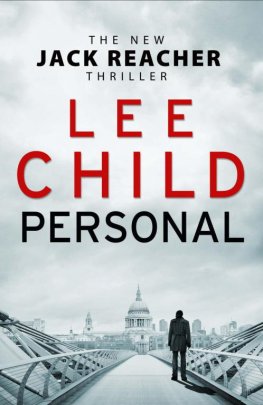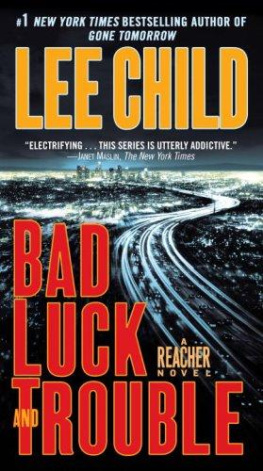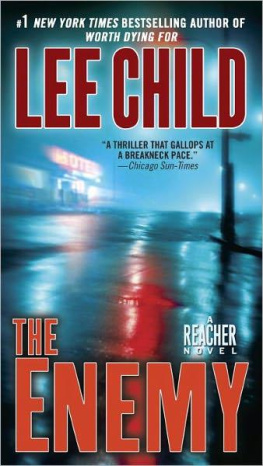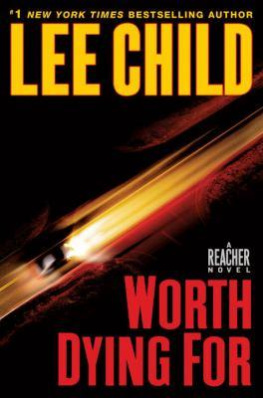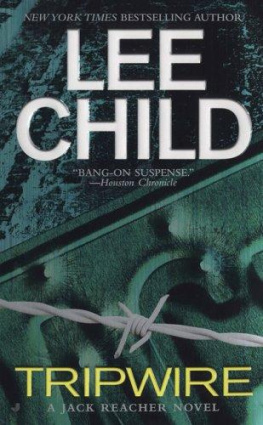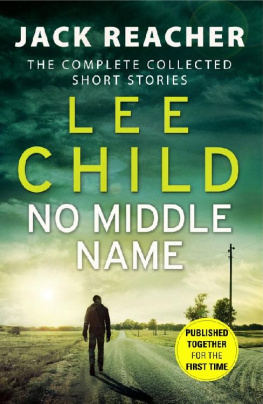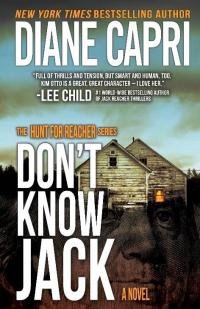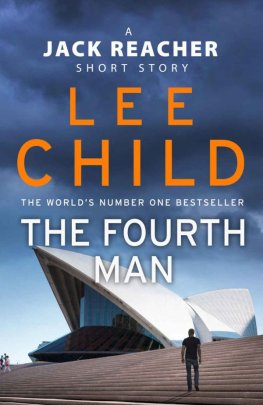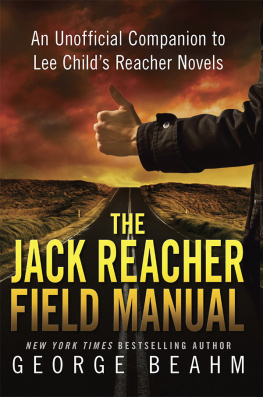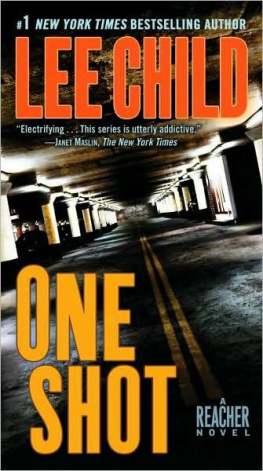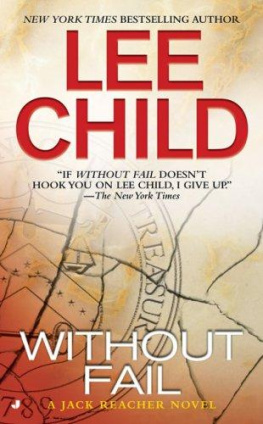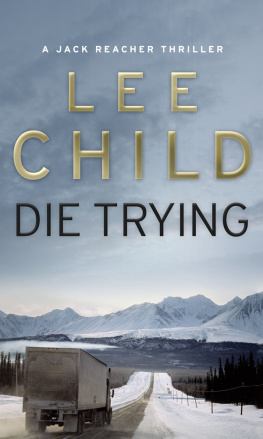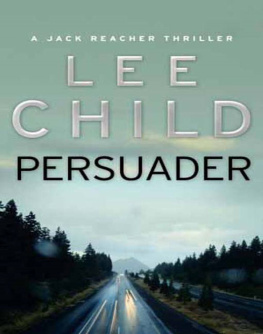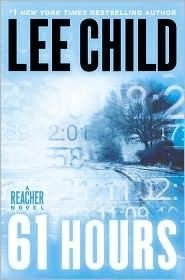For Andrew Grant and Tasha Alexander, my brother and sister-in-law: great writers and great people.
EIGHT DAYS AGO my life was an up and down affair. Some of it good. Some of it not so good. Most of it uneventful. Long slow periods of nothing much, with occasional bursts of something. Like the army itself. Which is how they found me. You can leave the army, but the army doesnt leave you. Not always. Not completely.
They started looking two days after some guy took a shot at the president of France. I saw it in the paper. A long-range attempt with a rifle. In Paris. Nothing to do with me. I was six thousand miles away, in California, with a girl I met on a bus. She wanted to be an actor. I didnt. So after forty-eight hours in LA she went one way and I went the other. Back on the bus, first to San Francisco for a couple of days, and then to Portland, Oregon, for three more, and then onward to Seattle. Which took me close to Fort Lewis, where two women in uniform got out of the bus. They left an Army Times behind, one day old, right there on the seat across the aisle.
The Army Times is a strange old paper. It started up before World War Two and is still going strong, every week, full of yesterdays news and sundry how-to articles, like the headline staring up at me right then: New Rules! Changes For Badges And Insignia! Plus Four More Uniform Changes On The Way! Legend has it the news is yesterdays because its copied secondhand from old AP summaries, but if you read the words sideways you sometimes hear a real sardonic tone between the lines. The editorials are occasionally brave. The obituaries are occasionally interesting.
Which was my sole reason for picking up the paper. Sometimes people die and youre happy about it. Or not. Either way you need to know. But I never found out. Because on the way to the obituaries I found the personal ads. Which as always were mostly veterans looking for other veterans. Dozens of ads, all the same.
Including one with my name in it.
Right there, centre of the page, a boxed column inch, five words printed bold: Jack Reacher call Rick Shoemaker.
Which had to be Tom ODays work. Which later on made me feel a little lame. Not that ODay wasnt a smart guy. He had to be. He had survived a long time. A very long time. He had been around for ever. Twenty years ago he already looked a hundred. A tall, thin, gaunt, cadaverous man, who moved like he might collapse at any moment, like a broken stepladder. He was no ones idea of an army general. More like a professor. Or an anthropologist. Certainly his thinking had been sound. Reacher stays under the radar, which means buses and trains and waiting rooms and diners, which, coincidentally or not, is the natural economic habitat for enlisted men and women, who buy the Army Times ahead of any other publication in the PX, and who can be relied upon to spread the paper around, like birds spread seeds from berries.
And he could rely on me to pick up the paper. Somewhere. Sooner or later. Eventually. Because I needed to know. You can leave the army, but the army doesnt leave you. Not completely. As a means of communication, as a way of making contact, from what he knew, and from what he could guess, then maybe he would think ten or twelve consecutive weeks of personal ads might generate a small but realistic chance of success.
But it worked the first time out. One day after the paper was printed. Which is why I felt lame later on.
I was predictable.
Rick Shoemaker was Tom ODays boy. Probably his second in command by now. Easy enough to ignore. But I owed Shoemaker a favour. Which ODay knew about, obviously. Which was why he put Shoemakers name in his ad.
And which was why I would have to answer it.
Predictable.
Seattle was dry when I got out of the bus. And warm. And wired, in the sense that coffee was being consumed in prodigious quantities, which made it my kind of town, and in the sense that wifi hotspots and handheld devices were everywhere, which didnt, and which made old-fashioned street-corner pay phones hard to find. But there was one down by the fish market, so I stood in the salt breeze and the smell of the sea, and I dialled a toll-free number at the Pentagon. Not a number youll find in the phone book. A number learned by heart long ago. A special line, for emergencies only. You dont always have a quarter in your pocket.
The operator answered and I asked for Shoemaker and I got transferred, maybe elsewhere in the building, or the country, or the world, and after a bunch of clicks and hisses and some long minutes of dead air Shoemaker came on the line and said, Yes?
This is Jack Reacher, I said.
Where are you?
Dont you have all kinds of automatic machines to tell you that?
Yes, he said. Youre in Seattle, on a pay phone down by the fish market. But we prefer it when people volunteer the information themselves. We find that makes the subsequent conversation go better. Because theyre already cooperating. Theyre invested.
In what?
In the conversation.
Are we having a conversation?
Not really. What do you see directly ahead?
I looked.
A street, I said.
Left?
Places to buy fish.
Right?
A coffee shop across the light.
Name?
I told him.
He said, Go in there and wait.
For what?
For about thirty minutes, he said, and hung up.
No one really knows why coffee is such a big deal in Seattle. Its a port, so maybe it made sense to roast it close to where it was landed, and then to sell it close to where it was roasted, which created a market, which brought other operators in, the same way the auto makers all ended up in Detroit. Or maybe the water is right. Or the elevation, or the temperature, or the humidity. But whatever, the result is a coffee shop on every block, and a four-figure annual tab for a serious enthusiast. The shop across the light from the pay phone was representative. It had maroon paint and exposed brick and scarred wood, and a chalkboard menu about 90 per cent full of things that dont really belong in coffee, like dairy products of various types and temperatures, and weird nut-based flavourings, and many other assorted pollutants. I got a plain house blend, black, no sugar, in the middle-sized go-cup, not the enormous grande bucket some folks like, and a slab of lemon pound cake to go with it, and I sat alone on a hard wooden chair at a table for two.
The cake lasted five minutes and the coffee another five, and eighteen minutes after that Shoemakers guy showed up. Which made him navy, because twenty-eight minutes was pretty fast, and the navy is right there in Seattle. And his car was dark blue. It was a low-spec domestic sedan, not very desirable, but polished to a high shine. The guy himself was nearer forty than twenty, and hard as a nail. He was in civilian clothes. A blue blazer over a blue polo shirt, and khaki chino pants. The blazer was worn thin and the shirt and the pants had been washed a thousand times. A Senior Chief Petty Officer, probably. Special Forces, almost certainly, a SEAL, no doubt part of some shadowy joint operation watched over by Tom ODay.
He stepped into the coffee shop with a blank-eyed all-in-one scan of the room, like he had a fifth of a second to identify friend or foe before he started shooting. Obviously his briefing must have been basic and verbal, straight out of some old personnel file, but he had me at six-five two-fifty. Everyone else in the shop was Asian, mostly women and very petite. The guy walked straight towards me and said, Major Reacher?
I said, Not any more.
He said, Mr Reacher, then?
I said, Yes.
Sir, General Shoemaker requests that you come with me.

